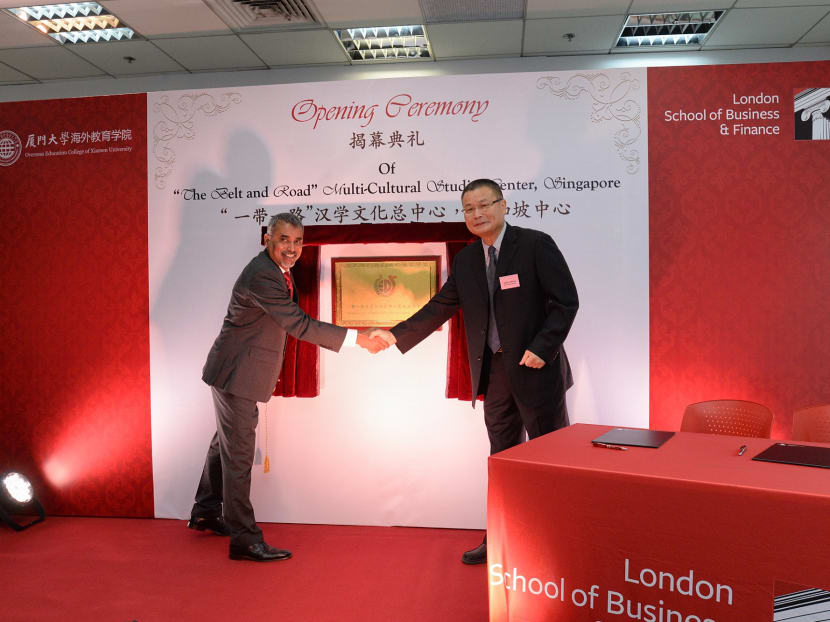First Belt and Road Studies Centre launches in S’pore
SINGAPORE — The first Belt and Road Multi-Cultural Studies Centre in Singapore was launched yesterday by the London School of Business and Finance (LSBF) here and the Overseas Education College (OEC) of China’s Xiamen University.

Mr Rathakrishnan Govind (left), London School of Business and Finance Global CEO, and Mr Zheng Tong Tao, dean of Xiamen University’s Overseas Education College, at the opening of the centre in Singapore yesterday. Photo: Robin Choo
SINGAPORE — The first Belt and Road Multi-Cultural Studies Centre in Singapore was launched yesterday by the London School of Business and Finance (LSBF) here and the Overseas Education College (OEC) of China’s Xiamen University.
To be funded by the China Cultural Heritage Foundation under the auspices of China’s Belt and Road Initiative (BRI), the centre will offer transnational educational programmes, including executive-level short courses as well as academic degrees. The programmes are aimed at providing business executives and students with a better understanding of the BRI, as well as insight into and an appreciation of Chinese cultural nuances, business etiquette and expectations.
The first programme is expected to start by next January. “Understanding the culture and cultural sensitiveness of doing business is essential to any Belt and Road venture. The collaboration is based on this foundation,” said Mr Rathakrishnan Govind, CEO of LSBF Global.
Students and businesses can now interact and exchange views using the centre and the university as platforms to connect them and gain valuable knowledge with a view to increasing trade and improving people-to-people bonding, added Mr Govind.
The China Cultural Heritage Foundation aims to play an active role in the planning, implementation and coordination of related programmes with LSBF in Singapore in the coming months, said Mr Wu Guo Yang, director of the BRI Project Fund at the foundation. Administered by China’s Ministry of Culture, the foundation is dedicated to promoting cooperation and exchange in cultural heritage in China and abroad.
Speaking on other such initiatives across countries, Mr Wu told TODAY: “There are plans to set up museums which exhibit overseas Chinese culture. But our focus remains on achieving economic development through cultural and education exchange.”
While Mr Wu did not name specific countries in which the museums are likely to be set up, he said the intention is to have it in nations with large populations of Chinese immigrants, such as Singapore.
Experts at the FutureChina Global Forum held last week in Singapore also emphasised that for the BRI to be a win-win for all 65 countries involved, cross-cultural communication and healthy partnerships with Chinese companies are vital.
In the opening speech at the forum, Deputy Prime Minister Teo Chee Hean noted that while much attention has been focused on the “headline-grabbing value and scale” of some large infrastructure projects along the Belt and Road, “China appreciates that realising the full potential of BRI involves more dimensions and layers”.
Highlighting the BRI’s overarching concept of boosting connectivity, Mr Teo said: “This means going beyond being driven principally and financially by China, to being inclusive, with co-ownership by partners and support from people from countries along the Belt and Road. It also entails connecting projects, and looking not only at building physical linkages but also digital and human networks.”
He said the shared experiences from the three bilateral flagship projects between Singapore and China may be useful for the Belt and Road projects. Singapore and China can collaborate with other countries along the Belt and Road in human capital development, including programmes to share experiences in project preparation and finance, operating ports and airports, and managing industrial parks and free trade zones, he said.





